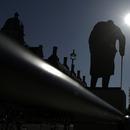Reckoning with America’s original sin.
Coming up on today’s show:
- The United Kingdom is on edge yet again after a van ran into a crowd of worshipers near a north London mosque. One man is dead, and at least 10 are injured. Ambassador Akbar Ahmed, the chair of Islamic Studies at American University in Washington, D.C and the former Pakistani High Commissioner to the U.K. and Ireland, explains what we know about the attack so far.
- In London, residents and protesters are furious with the government of Prime Minister Theresa May after a fire consumed Grenfell Tower, a 24 story-block of public housing that was set ablaze last Wednesday. Dawn Foster, a columnist for The Guardian, has the latest details on the investigation into the blaze, and the political fall out that has followed.
- Protesters took the streets of Minnesota on Friday after police officer Jeronimo Yanez was found not guilty for the shooting death of Philando Castile. Castile was a licensed gun owner and told Yanez he was carrying a weapon when he was in a car that was pulled over. The National Rifle Association has been relatively silent in the wake of Castile’s death. Rick Ector, a Detroit firearms instructor and gun rights advocate, explains what this verdict means for black gun owners in America.
- A forest fire in central Portugal killed more than 60 people this weekend. Government officials expect the death toll to rise as rescue workers continue to assess the damage. Claudia Silva, a reporter for the Portuguese newspaper Público, joins The Takeaway to give the latest on the fire’s aftermath.
- On Tuesday, voters in Georgia’s 6th Congressional District will choose between Democrat Jon Ossoff and Republican Karen Handel after the most expensive race in the history of the House of Representatives. Bill Nigut,host of “Political Rewind” from Georgia Public Broadcasting, has been following the campaign closely and explains what you need to know.
- On June 19, 1865, Union General Gordon Granger rode into Galveston, Texas to announce the Emancipation Proclamation, which ended slavery and the civil war. More than 150 years later, communities across the U.S. remember the day as Juneteenth. Isabel Wilkerson, a Pulitzer Prize-winning author of “The Warmth of Other Suns: The Epic Story of America’s Great Migration,” explains why she believes Juneteenth should be recognized as a national holiday.
- From 1919 until 1933, cabarets in Berlin created a space for social expression, including among LGBTQ people. As Hitler began to rise, they also became venues for resistance. Actor and writer Jeremy Lawrence created English versions of many of the cabaret songs from the time, and he performs them in a one man show called, “Lavender Songs: A Queer Weimar Berlin Cabaret.”
This episode is hosted by Todd Zwillich.
Sign up for our daily newsletter
